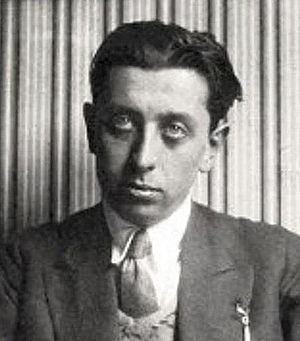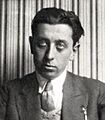Robert Desnos facts for kids
Quick facts for kids
Robert Desnos
|
|
|---|---|

Robert Desnos in 1924
|
|
| Born | 4 July 1900 Paris, France
|
| Died | 8 June 1945 (aged 44) Theresienstadt concentration camp, Czechoslovakia
|
| Known for | Poetry |
Robert Desnos (born 4 July 1900 – died 8 June 1945) was a famous French poet. He was a very important part of the Surrealist movement, which was a cool art and writing style.
Contents
Robert Desnos: A Poet's Journey
Early Life and Creative Beginnings
Robert Desnos was born in Paris, France, on 4 July 1900. His father sold game and poultry at a big market called Les Halles. Robert went to a business college and first worked as a clerk. He also helped a journalist named Jean de Bonnefon by writing things down for him. Later, he became a writer for the newspaper Paris-Soir.
Robert's first poems were printed in magazines when he was young. In 1917, his work appeared in La Tribune des Jeunes, and in 1919, in Le Trait d'union and a Dadaist magazine called Littérature. In 1922, he published his first book, Rrose Sélavy. This book was full of short, clever sayings in a surrealist style.
Joining the Surrealist Movement
In 1919, Robert met another poet, Benjamin Péret. Benjamin introduced him to the Dada group in Paris and to André Breton. Robert and André quickly became good friends. While working for Paris-Soir, Robert was very active in the Surrealist group. He was especially good at something called automatic writing. This is where writers try to write without thinking too much, letting their subconscious mind guide them.
Robert, along with writers like Louis Aragon and Paul Éluard, became a leader in surrealist writing. André Breton even put two photos of Robert sleeping in his surrealist novel Nadja. Breton praised Robert in his 1924 Surrealist Manifesto, calling him the movement's "prophet." However, Robert didn't agree with the Surrealists getting involved in communist politics. This caused a disagreement between him and Breton. Robert continued his work as a newspaper writer.
In 1926, he wrote a poem called The Night of Loveless Nights. It was about feeling lonely and was written in a classic style, which was different from other surrealist works. His friend Georges Malkine drew pictures for it. Robert fell in love with a singer named Yvonne George, but her many fans made it hard for him to be with her. He wrote several poems for her.
He also wrote articles about modern art, movies, and famous filmmakers like Sergei Eisenstein.
Radio Work and New Friends
Robert started working in radio in 1932, with a show about a detective character called Fantômas. During this time, he became friends with famous artists and writers like Picasso, Hemingway, Artaud, and John Dos Passos. He wrote many reviews about jazz music and movies. He also became more interested in politics.
He wrote for many magazines, including Littérature and La Révolution surréaliste. Besides his many poetry books, he also wrote three novels and a play. He even wrote a movie script for L'Étoile de mer (1928), which was directed by Man Ray.
Robert Desnos: A Hero in Wartime
Fighting in the French Resistance
During World War II, Robert Desnos became a brave member of the French Résistance. This was a secret group that fought against the German occupation of France. He worked for a network called Réseau AGIR, led by Michel Hollard. Robert often wrote under fake names to stay hidden. He gathered information from his job at the newspaper Aujourd'hui and helped create fake identity papers for others.
Sadly, the Gestapo (the German secret police) arrested him on 22 February 1944.
His Time in Concentration Camps
After his arrest, Robert was sent to several German concentration camps. He was first taken to Auschwitz in Poland, then to Buchenwald and Flossenburg in Germany. Finally, he was sent to Terezín (Theresienstadt) in occupied Czechoslovakia in 1945.
Robert Desnos died in Malá pevnost, a part of Terezín used for political prisoners. He died from typhoid fever, which is a serious illness, just one month after the camp was freed. There's a touching story about his last days. A young Czech medical student, Josef Stuna, recognized him because he had read Breton's Nadja and took care of him.
A Story of Hope in Despair
Writer Susan Griffin tells an amazing story that shows Robert Desnos's unique way of thinking, even in the worst situations. It's about how he could imagine solutions that seemed impossible:
Even in the toughest times, changing how you see things can make a huge difference. I heard a story from my friend Odette, who survived the Holocaust. She said that Robert Desnos was on a truck with many others, leaving the concentration camp. Everyone knew the truck was going to the gas chambers. When they arrived, everyone, even the guards, was silent.
But then, Robert Desnos jumped into the line and grabbed one of the prisoners. Amazingly, he started reading the man's palm! "Oh," he said, "I see you have a very long life ahead. And you will have three children!" He was so excited, and his excitement spread. First one man, then another, offered their hand, and Robert predicted long lives, more children, and great joy for them all.
As Robert read more palms, not only did the prisoners' mood change, but the guards' mood changed too. How can this be explained? Maybe the surprise made the guards doubt what they were doing. If they thought these deaths were unavoidable, it didn't seem so clear anymore. They were so confused by this sudden change in mood among the people they were about to kill that they couldn't go through with the executions. So, all the men, including Robert Desnos, were put back on the truck and taken back to the barracks. Robert Desnos saved his own life and the lives of others by using his imagination.
The "Last Poem" Legend
For a long time, people believed that Robert Desnos wrote a "Last Poem" (Dernier poème) before he died. This poem was even set to music by Francis Poulenc in 1956. However, this poem never actually existed. The misunderstanding started when a Czech newspaper published his obituary. It ended with a sentence saying his verses had "fulfilled" in a strange way, followed by a quote from his poem I Dreamt About You So Much.
When this was translated into French, it was translated incorrectly. It made it seem like the poem was found with him and dedicated to his wife. Because of this, the story of the "Last Poem" continued for many years. It was thanks to a Czech translator, Adolf Kroupa, who wrote two articles, that people finally learned the truth.
Robert Desnos was married to Youki Desnos. He wrote several poems about her, including his famous "Letter to Youki," which he wrote after he was arrested.
He is buried in the Montparnasse cemetery in Paris.
Robert Desnos's Lasting Impact
Music and Poetry
Many composers have used Robert Desnos's poetry in their music. These include Witold Lutosławski with Les Espaces du sommeil (1975) and Chantefleurs et Chantefables (1991), and Henri Dutilleux with Le Temps l'Horloge (2007). The American poet Carolyn Forché has translated his poems and says he greatly influenced her own writing.
Important Books
Here are some of Robert Desnos's important books:
- (1924) Deuil pour deuil; English title: Mourning for Mourning
- (1927) La Liberté ou l’amour!; English title: Liberty or Love!
- (1930) Corps et biens (Body and Goods)
- (1943) Le vin est tiré (The Wine is Drawn)
- (1944) Trente Chantefables; English title: Storysongs
Some of his works were published after he died:
- (1946) Choix de poèmes (a collection of poems chosen by Paul Eluard)
- (1953) Domaine public (includes many poems that had not been published before)
Images for kids
See also

 | William M. Jackson |
 | Juan E. Gilbert |
 | Neil deGrasse Tyson |


